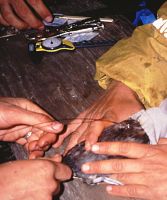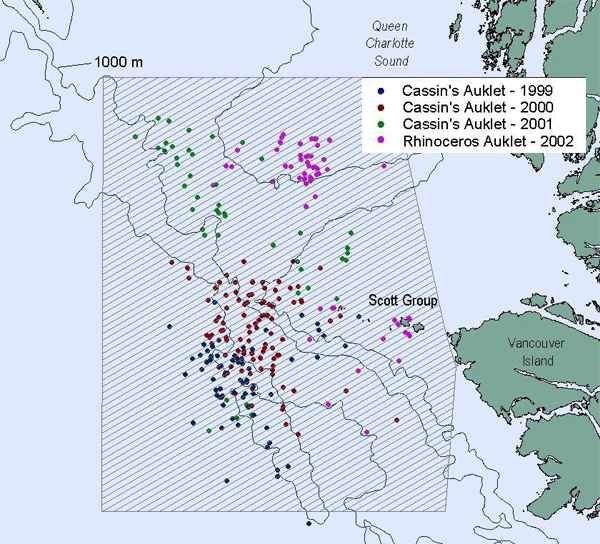|
|
|
 |
Formal Protection
for Critical Marine Habitat
Scientific Research on Triangle Island
|
|
|
|
|
|
|
|
In the late 1990s, the Canadian Wildlife Service put forward the Scott Islands Group Marine Area for designation under the Canada Wildlife Act, thus demonstrating its commitment to marine conservation. The Scott Islands Marine Wildlife Area is being created primarily to protect key habitat, such as foraging habitat, for the huge numbers of seabirds that use these waters throughout the year. However, a critical information gap became apparent early in the process:
|
|
|
|
What are the foraging ranges of seabirds that breed on the Scott Islands?
And more specifically, where do they forage?
|
|
|
|
To answer these questions, researchers from the Centre for Wildlife Ecology placed radio transmitters on Cassin's Auklets breeding at Triangle Island during the chick-rearing periods of 1999, 2000, and 2001. By flying transects in fixed-wing aircraft, they were able to locate the radioed birds at sea. The same techniques were used to locate foraging areas of Rhinoceros Auklets breeding on Triangle in 2002. |
|
 |
|
|
|
What did we find? |
|
|
|
 |
|
|
|
In 1999 and 2000, radioed Cassin's Auklets were detected mainly 50-75 km southwest of Triangle, off the continental shelf break and over very deep water, in association with dense concentrations of Neocalanus copepods. In 2001, they foraged at similar distances but in that year to the north and west of Triangle, and again over deep water. In 2002, radioed Rhinoceros Auklets foraged mainly up to 80 km to the north of Triangle, on the shelf in waters just over 100 m deep, where they likely were obtaining forage fish such as Pacific saury. |
|
|
| The important thing to note is that, without information on foraging ranges and foraging locations, the original boundaries proposed for the Scott Islands MWA were too small to encompass these important areas. But provided with information on foraging ranges and locations by CWE researchers, CWS biologists were able to draw up biologically relevant boundaries for the MWA. The process leading to the designation of the Scott Islands Marine Wildlife Area is still ongoing. |
|
|
|
|
|
|
|
|
|
|
|
|
|
|
|
|
|
|
|


